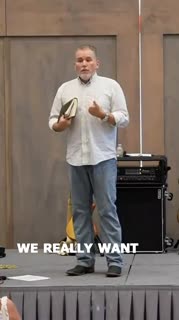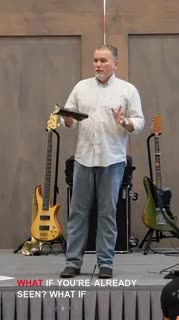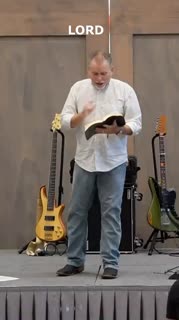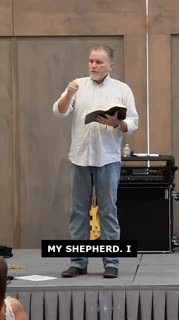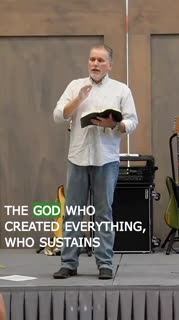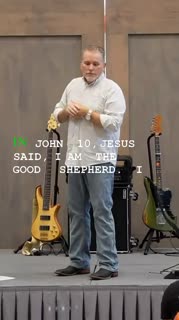Finding Fulfillment in God: Our True Shepherd
Devotional
Sermon Summary
Bible Study Guide
Sermon Clips
1. "We really want to be fully known and fully loved. What we really want is to have intimacy in relationships with people. We want to be able to be transparent, to be who I am. No games, no masks. And you accept me and you love me. And we have a relationship. But that's hard. That takes time. That takes sacrifice on my part. That takes risk to put myself out there for that type of a relationship. And sacrifice and risk and time are hard. And so we settle for a small moment of being somebody. Like a viral person. Somebody goes viral and influences doesn't last. But it's kind of like a relational dopamine hit. Like being known is hard. But being somebody for a moment lets me feel that just for a glimpse. And so I chase after it. Because we know deep down inside we want to be loved." [30:35] (59 seconds)
2. "What if you're already seen? What if you're already known? What if you're already loved? And what if you're already valuable to the most important being in the universe? If you got your Bible, I want you to Psalm chapter 23. I think Scott shared with you, we're starting four weeks through this iconic passage. It's iconic because even people who have never opened a Bible have often had moments with Psalm 23. It might have been at a funeral. Where they saw Psalm 23 written out. They might have been big Coolio fans and saying, though I walked through the valley of the shadow of death. Rest in peace, Coolio. It's an iconic passage we know. And so for the next four weeks, we're going to journey through it." [34:46] (53 seconds)
3. "The Lord is my shepherd. I have all that I need. He lets me rest in green meadows. He leads me beside peaceful streams. He renews my strength. He guides me along right paths, bringing honor to his name. Even when I walk through the darkest valley, I will not be afraid for you're close beside me. Your rod and your staff protect and comfort me. You prepare a feast for me in the presence of my enemies. You honor me by anointing my head with oil. My cup overflows with blessings. Surely your goodness and unfailing love will pursue me all the days of my life. And I will live in the house of the Lord forever." [38:20] (36 seconds)
4. "The Lord is my shepherd. I have all that I need. all have shepherds. Every one of us actually, everyone that walked in this room has something or someone that influences you. That's what a shepherd did. He influenced the sheep towards where they need to be. All of us have shepherds. Like for some of us, it may be culture. Culture shepherds us and, and wherever the current of culture goes, we find ourselves there. Some of us are shepherded by political affiliation. Like we go, Hey, this is my team or that's my team. And wherever my affiliation of politics goes, we find ourselves there. And wherever my affiliation of politics goes, that's where I'm going. And that's what I believe. And that's what I speak about. Some of us are shepherded by a career or bosses or a business, a company. Some of us are shepherded maybe by people, a relationship. We're all shepherded." [40:46] (45 seconds)
5. "The God who created everything, who sustains everything is your shepherd. And he's not going to force his way in. You get to choose. You get to decide who the shepherd is. It's a great story. Tell me I have a book written about Psalm 23. And the author was studying what it looked like to shepherd. And he was in East Africa watching shepherds, learning about it. And he came across an area where there was pasture that was divided by a fence. And on one side of the fence, there was green grass and there was healthy sheep. And on the other side, the grass had been overeaten. And the sheep really didn't have a whole lot to graze. They didn't graze on any longer. They were skinny. And on this side, they were healthy. On this side, they were diseased and in bad shape. Because the shepherd, the shepherd had just neglected. But the shepherd on this side of the fence was taking care of the sheep. And they were in great shape." [01:00:37] (67 seconds)
6. "In John 10, Jesus said, I am the good shepherd. I am the good shepherd. Just as God said, I am who I am. And Jesus made the declaration to people. I am the God of Psalm 23. I am, Jesus, the God who is your good shepherd. I am the good shepherd. God who provides. I am the God who protects. I am the God who is transcendent. And I'm the shepherd. And Jesus talks. He uses that shepherd imagery all the time. I'll leave the 99 to go after the one that wandered off. Because He wants you. He wants you in the green pasture. He wants to meet your need. He wants you to be loved and known. And He wants you to be able to say, I'm valuable. Because the shepherd, the God of the universe, values me." [01:02:03] (61 seconds)
Ask a question about this sermon
2. "What if you're already seen? What if you're already known? What if you're already loved? And what if you're already valuable to the most important being in the universe? If you got your Bible, I want you to Psalm chapter 23. I think Scott shared with you, we're starting four weeks through this iconic passage. It's iconic because even people who have never opened a Bible have often had moments with Psalm 23. It might have been at a funeral. Where they saw Psalm 23 written out. They might have been big Coolio fans and saying, though I walked through the valley of the shadow of death. Rest in peace, Coolio. It's an iconic passage we know. And so for the next four weeks, we're going to journey through it." [34:46] (53 seconds)
3. "The Lord is my shepherd. I have all that I need. He lets me rest in green meadows. He leads me beside peaceful streams. He renews my strength. He guides me along right paths, bringing honor to his name. Even when I walk through the darkest valley, I will not be afraid for you're close beside me. Your rod and your staff protect and comfort me. You prepare a feast for me in the presence of my enemies. You honor me by anointing my head with oil. My cup overflows with blessings. Surely your goodness and unfailing love will pursue me all the days of my life. And I will live in the house of the Lord forever." [38:20] (36 seconds)
4. "The Lord is my shepherd. I have all that I need. all have shepherds. Every one of us actually, everyone that walked in this room has something or someone that influences you. That's what a shepherd did. He influenced the sheep towards where they need to be. All of us have shepherds. Like for some of us, it may be culture. Culture shepherds us and, and wherever the current of culture goes, we find ourselves there. Some of us are shepherded by political affiliation. Like we go, Hey, this is my team or that's my team. And wherever my affiliation of politics goes, we find ourselves there. And wherever my affiliation of politics goes, that's where I'm going. And that's what I believe. And that's what I speak about. Some of us are shepherded by a career or bosses or a business, a company. Some of us are shepherded maybe by people, a relationship. We're all shepherded." [40:46] (45 seconds)
5. "The God who created everything, who sustains everything is your shepherd. And he's not going to force his way in. You get to choose. You get to decide who the shepherd is. It's a great story. Tell me I have a book written about Psalm 23. And the author was studying what it looked like to shepherd. And he was in East Africa watching shepherds, learning about it. And he came across an area where there was pasture that was divided by a fence. And on one side of the fence, there was green grass and there was healthy sheep. And on the other side, the grass had been overeaten. And the sheep really didn't have a whole lot to graze. They didn't graze on any longer. They were skinny. And on this side, they were healthy. On this side, they were diseased and in bad shape. Because the shepherd, the shepherd had just neglected. But the shepherd on this side of the fence was taking care of the sheep. And they were in great shape." [01:00:37] (67 seconds)
6. "In John 10, Jesus said, I am the good shepherd. I am the good shepherd. Just as God said, I am who I am. And Jesus made the declaration to people. I am the God of Psalm 23. I am, Jesus, the God who is your good shepherd. I am the good shepherd. God who provides. I am the God who protects. I am the God who is transcendent. And I'm the shepherd. And Jesus talks. He uses that shepherd imagery all the time. I'll leave the 99 to go after the one that wandered off. Because He wants you. He wants you in the green pasture. He wants to meet your need. He wants you to be loved and known. And He wants you to be able to say, I'm valuable. Because the shepherd, the God of the universe, values me." [01:02:03] (61 seconds)
